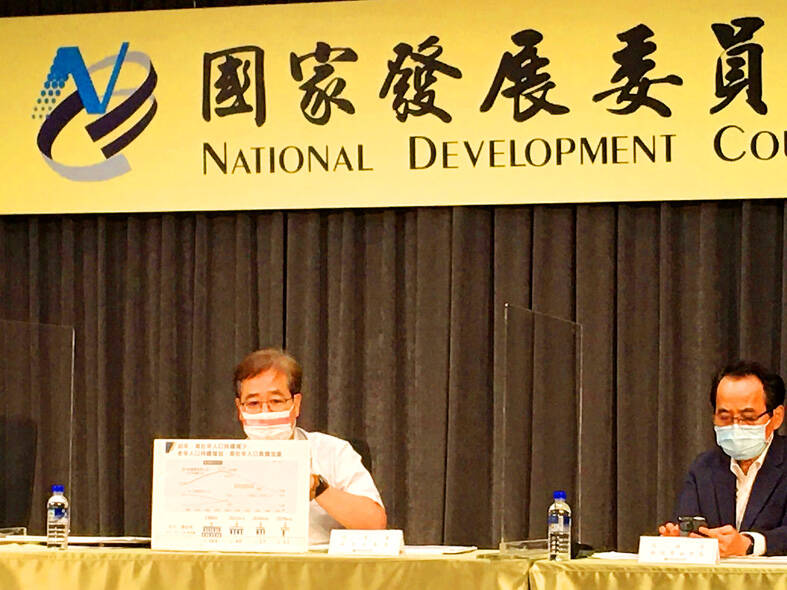Taiwan is still set to become a super-aged society by 2025, but with a larger dependent population than forecast in a previous study in 2020, meriting the attention of policymakers, the National Development Council said yesterday.
The council made the call after releasing its biannual projection on the nation’s demographic trends for the coming 50 years, based on latest household registration, birth, death, migration and other data.
“Taiwan is on schedule to become a super-aged society in three years, when the ratio of people aged 65 years or older will exceed 20 percent” of total population, the council said.

Photo: Wu Hsin-tien, Taipei Times
While the pace of aging remains the same and the demographic dividend is expected to end in 2028 as previously projected, the dependent population has been growing faster than expected, the council said.
The dependent population — including children and people aged 65 or older — would be equal to 42.2 percent of the workforce this year and climb to 53.2 percent in 2030, and outnumber the working population by 2060, four years earlier than previously forecast, the council said.
The number of people aged 15 to 64, or the working-age population, is projected to reach 16.3 million this year, before falling to 15.07 million by 2030 and to 7.76 million by 2070, the council said.
The number of elderly people is increasing, while the workforce is shrinking, the council said.
If unaddressed, the trend would be unfavorable and unhealthy for economic and social development, it said.
The demographic dividend ends when the number of people aged 15 to 64 account for less than 75 percent of the overall workforce, signifying a sluggish labor force and an increasing social burden, it said.
The government can tackle demographic challenges by boosting the birthrate to slow the pace of aging, and by encouraging senior citizens and women to join the labor force, the council said.
Low wages in Taiwan make young people unwilling and hesitant to marry and raise children, pundits have said.
In the meantime, the government should motivate the private sector to transform and upgrade operations, for example by embracing automation to cut its dependence on human labor, the council said.
Policymakers should relax immigration requirements so that foreigners can move to Taiwan for work more easily, it said.
The government should adopt measures to make Taiwan a safe and friendly living environment for elderly people, the council said.

PREPAREDNESS: Given the difficulty of importing ammunition during wartime, the Ministry of National Defense said it would prioritize ‘coproduction’ partnerships A newly formed unit of the Marine Corps tasked with land-based security operations has recently replaced its aging, domestically produced rifles with more advanced, US-made M4A1 rifles, a source said yesterday. The unnamed source familiar with the matter said the First Security Battalion of the Marine Corps’ Air Defense and Base Guard Group has replaced its older T65K2 rifles, which have been in service since the late 1980s, with the newly received M4A1s. The source did not say exactly when the upgrade took place or how many M4A1s were issued to the battalion. The confirmation came after Chinese-language media reported

A Ministry of Foreign Affairs official yesterday said that a delegation that visited China for an APEC meeting did not receive any kind of treatment that downgraded Taiwan’s sovereignty. Department of International Organizations Director-General Jonathan Sun (孫儉元) said that he and a group of ministry officials visited Shenzhen, China, to attend the APEC Informal Senior Officials’ Meeting last month. The trip went “smoothly and safely” for all Taiwanese delegates, as the Chinese side arranged the trip in accordance with long-standing practices, Sun said at the ministry’s weekly briefing. The Taiwanese group did not encounter any political suppression, he said. Sun made the remarks when

The Taiwanese passport ranked 33rd in a global listing of passports by convenience this month, rising three places from last month’s ranking, but matching its position in January last year. The Henley Passport Index, an international ranking of passports by the number of designations its holder can travel to without a visa, showed that the Taiwan passport enables holders to travel to 139 countries and territories without a visa. Singapore’s passport was ranked the most powerful with visa-free access to 192 destinations out of 227, according to the index published on Tuesday by UK-based migration investment consultancy firm Henley and Partners. Japan’s and

BROAD AGREEMENT: The two are nearing a trade deal to reduce Taiwan’s tariff to 15% and a commitment for TSMC to build five more fabs, a ‘New York Times’ report said Taiwan and the US have reached a broad consensus on a trade deal, the Executive Yuan’s Office of Trade Negotiations said yesterday, after a report said that Washington is set to reduce Taiwan’s tariff rate to 15 percent. The New York Times on Monday reported that the two nations are nearing a trade deal to reduce Taiwan’s tariff rate to 15 percent and commit Taiwan Semiconductor Manufacturing Co (TSMC, 台積電) to building at least five more facilities in the US. “The agreement, which has been under negotiation for months, is being legally scrubbed and could be announced this month,” the paper said,